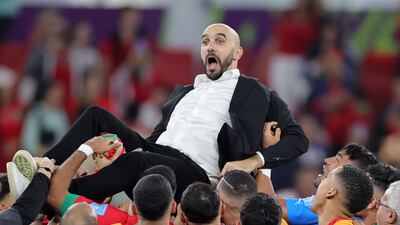Walid Regragui is a hero for his continent. To see a sculpture of him, distinctive beard and smooth pate, on show in an art market in San-Pedro, where Regragui’s Morocco are based during the opening phase of the Africa Cup of Nations in Ivory Coast, is to appreciate the wide impact he has made over a relatively short time.
Regragui has been recognised and celebrated as the pathfinder for unprecedented regional success, since, at the last World Cup, he was the first coach to guide any African or Arab team to the competition’s semi-final stage.
Starting Wednesday, he seeks to build on that, to complete a personal trilogy by adding an Afcon title to the African Champions Cup he won at the helm of Wydad of Casablanca a few short months before being asked, with little preparation time, to take the national team to Qatar 2022, there to make history.
In some respects, the Afcon target can look like the toughest task of the three. Morocco are chronic underachievers at this event – their sole triumph that of 1976 – and it is a shortfall Regragui’s coaching staff are presenting to players as a personal challenge.
“Here on the staff, Walid, the assistant coach Gharib Amzine and myself have all made mistakes at Afcons that we don’t want to see repeated here,” said Rachid Benmahmoud, another one of Regragui's assistants.
Between them, as players, Regragui, Amzine and Benmahnoud lived through a series of disappointments at four Afcons between 2000 and 2006, a gloomy run of three group-stage exits, and just one respectable placing, the silver medal achieved with Regragui as Morocco’s busy full-back in 2004.
Fresher in the rear-view mirror is the quarter-final defeat to Egypt in Cameroon two years ago. Romain Saiss, the captain then and now, has briefed the squad’s newcomers this is an event of unique demands. “I’ve been telling the younger players this is a hard competition physically and mentally, very different to the football they know from Europe or from a World Cup,” said Saiss.
“For me it’s important they pick that up quickly. It’s about self-sacrifice and staying in the battle, being 100 per cent right mentally from the word go.”
Morocco's path to World Cup 2022 semi-final
Saiss, 33, is a veteran of three unfulfilling Afcons, including two exits against Egypt, the last of them bad-tempered and with a fractious aftermath. Hakim Ziyech and Noussair Mazraoui both made themselves unavailable for selection after the 2022 Afcon, part of a crisis leading to the departure of Vahid Halilhodzic as manager and the Moroccan Federation’s urgent call to Regragui.
As central to his success as a sound tactical vision was the diplomacy that brought Ziyech back into the fold and coaxed Mazraoui’s buy-in to playing in an unfamiliar left-back position.
Mazraoui will be missing for Wednesday's Group F opener against Tanzania, with a calf problem, around which Regragui and his staff are weathering some very public lobbying from the player's coach at Bayern Munich, Thomas Tuchel, who has urged the full-back to be allowed to stretch his recovery at least until the third group match.
This is not Tuchel’s decision to make, but it is fact of Afcon life that club matters tend to intrude, particularly from European clubs whose players are away in mid-season.
The potential distractions from club football are several. Azzedine Ounahi, whose excellent World Cup in Qatar made him a transfer target, finds himself linked with possible moves this January window, 12 months after he joined Marseille.
Ounahi’s midfield drive, a complement to Sofyan Amrabat’s covering and authoritative passing, remains a key asset for Morocco and should now be complemented with some fresh sources of creativity.
While Morocco in Qatar were masters at being patient and resilient out of possession, as they overcame Belgium, Spain and Portugal on the way to their semi-final against France, the onus will be on being more proactive against the likes of Tanzania, the lowest ranked team at Afcon, and Group F’s DR Congo and Zambia.
Marseille’s Amine Harit, who missed the World Cup with injury, has a potential role to play in that aspect. Likewise Bilal El Khannous, the teenager who helped Morocco to the under-23 Afcon title last June.
Amine Adli, the 23-year-old Bayer Leverkusen winger who last year committed to the Atlas Lions ahead of his native France, offers fresh zest on the wing, too.
Adli’s mother passed away just before Afcon began but has rejoined the squad in San-Pedro. “The loss of your mother is hard for anyone, especially at his age,” said Regragui. “But he has come back to us in a positive spirit and I feel very thankful to him. He chose to rejoin us. That shows his commitment.”













